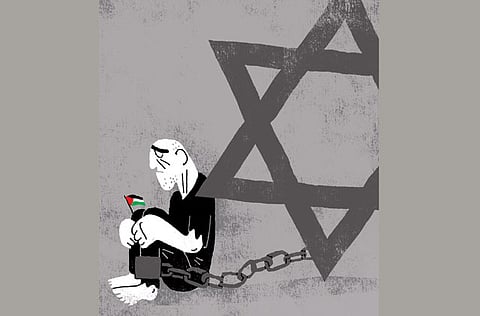A struggle for Palestinian identity
Jaradat’s death depicts the sad fate of a people fighting for equality

The abuse of prisoners is nothing new. Prisoners are a pain in the neck; they are an expense to maintain alive. If they are enemies of the state — as many Palestinian prisoners are for Israel — then that state must now ensure, according to humanitarian law and international human rights, that all prisoners are treated properly. That is really annoying for Israel.
And this is precisely the argument being advanced by the Palestinians. The grassroots and civil society movements supporting the plight of the prisoners are not claiming that they are innocent. In 2011, the hunger strike was launched by Khadr Adnan, a member of the group Islamic Jihad that endorses the use of violence to achieve the liberation of Palestine.
It is not innocence that is being advanced; it is a sense of unrequited justice that is replete in the Palestinian discourse. Years and decades of festering frustration have led the Palestinians to call for Israel to either finish them off or to release them of their bondage. They ask Israel to condemn them for existing or to free them. Put us on the stand! Sentence us for something, cry the Palestinians.
A majority of the nearly 5,000 Palestinian prisoners vegetating in Israeli jails are being detained without trial in sight. Their cause has been picked up by the same underdogs that launched the freedom flotillas — they are clever and have found the Achilles heel of and loopholes in the Israeli security system, and their strategy is to exploit those inconsistencies on the international stage.
In essence, such groups as the Council for European Palestinian Relations (CEPR) based in London with a mini lobby office in Brussels and a regional office in Gaza, are smart to play the humanitarian card, particularly because it elicits solidarity and support from international human rights groups, and it appeals to the Christian feeling of guilt, of good-vs-evil, so prevalent still in Europe’s discourse.
Hunger artists
How can Israel claim to be a democracy and respect human rights — one of the pillars of modern liberal democracies — when they deny basic civil rights to their Arab and Bedouin minorities and blatantly violate the international code of human rights? The prisoner who died last week was tortured to death: Six bones were broken in his neck, spine, arms and legs.
His name was Arafat Jaradat. He was 30 years old and the father of three children. He worked at a gas station and was detained by Israel for throwing stones at the Jewish colony of Kiryat Arba outside the violently contested West Bank city of Hebron in 2011. He was starving himself to death to show his self-destructive dedication to remain a proud Palestinian.
The hunger strike tactic is a different approach from the victorious ‘V’ flashed by the shackled leader of Fatah, Marwan Barghouti, also detained for decades for violent means of resistance against Israel.
Devoid of a leader, the grassroots movements behind the hunger strikers are calling for the masses to mobilise again, from the nearly 5,000 prisoners to the millions of Palestinians still imprisoned within the sordid Israeli military occupation of the West Bank. Palestinian Minister of Prisoner Affairs, Eisa Qaraqe, expressed dismay at Jaradat’s death, and called on US President Barack Obama to pressure Israel into releasing the prisoners before his visit there in March, “or else he will visit while Palestine is on fire”. Many pundits have been calling for a third intifada, but these are the same smouldering embers from the injustices created and left by European colonialism.
This would not be a third round of popular Palestinian uprisings; the Palestinians have been squashed by Israel’s military machine; they are subdued and controlled by an omniscient Israeli security system; it is sad and pathetic to watch the hunger strikes. The Palestinians are becoming like performance artists, much like in Kafka’s short story, A Hunger Artist. Although one could read this tragedy unfolding as yet another facet of Kafka in action, the difference is that these are real people dying. They have been anonymous for years and in their desperation they are attempting to inscribe their names on the headlines of international news outlets to prove that they existed, to be remembered for having fought to maintain an existential place for Palestine.
But this is just a tactic to gain visibility. One should not forget that previous Fatah strongman Mohammad Dahlan (backed by Israel and the US) was notorious for his torture methods on Hamas prisoners in Gaza during the Oslo years. Now, the tides have turned, and the points being marked by the hunger artists are all going to the grassroots Islamist movements.


